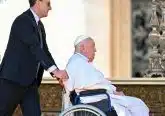Pope Francis on day of prayer for Ukraine: ‘Please, no more war’
Vatican City, Jan 26, 2022 / 04:28 am
At the beginning of the Catholic Church’s day of prayer for peace in Ukraine, Pope Francis made an earnest appeal to those in power: “Please, no more war.”
“I invite you to pray for peace in Ukraine and to do so often throughout this day,” the pope said at the end of his general audience on Jan. 26.
“Let us ask the Lord insistently that this land may see fraternity flourish and overcome wounds, fears, and divisions.”
The pope urged people not to forget the more than five million people who died in Ukraine during World War II.
“Think that more than five million were annihilated during the time of the last war. They are a suffering people; they have suffered hunger, they have suffered so much cruelty and they deserve peace,” Francis said.
“May the prayers and invocations that are being raised to heaven today touch the minds and hearts of those in positions of authority on earth, so that dialogue may prevail and the good of all be put before the interests of one side. Please, no more war.”
Pope Francis called for Jan. 26 to be a day of prayer for peace in Ukraine during his Angelus address last Sunday amid fears of a potential deeper Russian incursion into the Eastern European country.
Archbishop Paul Gallagher, the Vatican’s Secretary for Relations with States, will preside over a prayer for peace in Ukraine in Rome’s Basilica of Santa Maria in Trastevere at 5:30 p.m. local time, the same time as Catholics in the Community of Sant’Egidio will gather in Ukraine’s capital city of Kyiv to pray.
“I make a heartfelt appeal to all people of goodwill, that they may raise prayers to God Almighty, that every political action and initiative may serve human brotherhood, rather than partisan interests,” Pope Francis said on Jan. 23.
“Those who pursue their own interests, to the detriment of others, disregard their human vocation, as we were all created as brothers and sisters.”
Catholic bishops in Europe have also expressed support for Ukraine and appealed to Christians to pray for peace.
“At this extremely delicate time, we ask Christians to pray for the gift of peace in Ukraine so that those responsible may be filled with, and radiate, a peace that is ‘contagious’ and that the crisis will be overcome exclusively through dialogue,” the Council of European Bishops’ Conferences (CCEE) said.
Major Archbishop Sviatoslav Shevchuk, head of the Ukrainian Greek Catholic Church, and Archbishop Stanisław Gądecki, president of the Polish bishops’ conference, said earlier this week that rising tensions with Russia pose “a great danger” to the whole of Europe.
“The current situation represents a great danger for the countries of Central and Eastern Europe and the entire European continent, which may destroy the progress made so far by many generations in building a peaceful order and unity in Europe,” their appeal, also signed by other bishops, said.
Ukraine, which has a population of 44 million people, borders Moldova, Romania, Hungary, Slovakia, Poland, Belarus, and Russia.
The Russo-Ukrainian War began in February 2014, focused on the east of Ukraine. The conflict has claimed more than 14,000 lives and driven 1.3 million people from their homes, according to Caritas Internationalis, a Vatican-based confederation of Catholic charities raising funds for those affected.
The warring parties agreed to a cease-fire in July 2020. But Russia has sent an estimated 100,000 troops to the Ukrainian border. U.S. President Joe Biden said on Jan. 19 that he expected Russian President Vladimir Putin to order an invasion.
The U.S. State Department said on Jan. 23 that it had ordered the departure of family members of U.S. government employees at the U.S. embassy in Kyiv.
In their joint message, the bishops of Ukraine and Poland called for a diplomatic solution to the crisis.
“Today, the quest for alternatives to war in resolving international conflicts has become an urgent necessity, since the terrifying power of the means of destruction are now in the hands of even medium and small powers, and the increasingly strong ties existing between the peoples of the whole earth make it difficult, if not practically impossible, to limit the effects of any conflict,” they said.
“Therefore, drawing on the experience of previous generations, we call upon those in power to refrain from hostilities. We encourage leaders to immediately withdraw from the path of ultimatums and the use of other countries as bargaining chips.”
“Differences in interests must be resolved not by the use of arms, but through agreements. The international community should unite in solidarity and actively support endangered society in all possible ways.”













